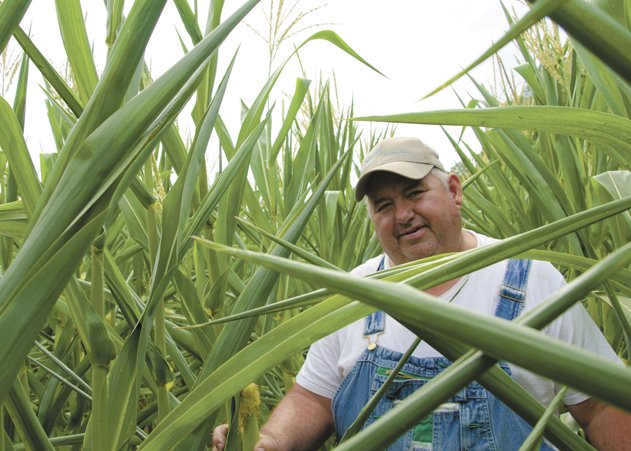Soil Health Resources - David Brandt
Ohio and the nation lost a major soil health resource named David Brandt this past weekend. David (76) passed away after a truck accident in Illinois. David was known as a “soil health” advocate, teaching about no-till, cover crops (radish, vetch, multi-species cover crops), and how to conserve soil. David changed his soil from a hard, cloddy brown soil into a beautiful productive black, crumbly soil in the a little over 25 years with his farming practices (no-till, cover crops). David was a Vietnam veteran but also a popular “Meme” on the internet because of his bib overalls, his folksy manner, and his honesty. David will be sorely missed.
In honor of David and his soil health teachings, I am going to list a number of soil health resources so that people can learn more about no-till, cover crops, and soil health; starting with the simple and moving to the more advanced.
The Plowman’s Folly (1943) written by Edward H. Faulkner, published by Grosset and Dunlap is still true today and is a classic book everyone should read. Written after the Dust Bowl in the 1930’s, it describes the impact of soil erosion on drought and soil productivity.
Several good manuals include Managing Cover Crops Profitably, published by the Sustainable Agricultural Research and Education (SARE), USDA. The Midwest Cover Crops Field Guide explains how to get started planting and managing cover crops. Building Soils for Better Crops: Sustainable Soil Management by Fred Magdoff and Harold Van Es are very good introductory books on managing soils sustainably. An easy-to-read book is entitled A Soil Owner’s Manual, by Jon Stika, retired NRCS conservationist. Jon made the quote: Soil health is more about using seeds to build soil rather than steel to disturb it!
Dr. David Montgomery, a Professor of Geology has written a number of readable books about soil. Dirt: The Erosion of Civilization was his first book (2007) followed by The Hidden Half of Nature: The Microbial Roots of Life and Health (2016). He also wrote Growing a Revolution: Bringing our Soil Back to Life (2017) all published by W.W. Norton and Company.
If you want to know more about microbes without getting too technical, read four books by Jeff Lowenfels. Teaming with Microbes, Teaming with Nutrients, Teaming with Fungi, and Teaming with Bacteria, are excellent books published by Timber Press. Another book by Rhonda Sherman is the Worm Farmer’s Handbook (2018) which describes various composting methods using red worms which are soil inoculators of beneficial microbes.
For more advanced and technical readers, try Soil Ecology by Patrick Lavelle and Allister V. Spain (2005). To understand the link between plant disease and plant nutrition, try Healthy Crops by Francis Chaboussou (2013) and Mineral Nutrition and Plant Disease by Lawrence Datnoff, Wade Elmer, and Don Huber (2018). For information on adapting to adverse weather and climate change read Unsettled by Dr. Steven E. Koonin which gives a good overview of our “slowly” changing climate without all the hype!
A good text book on soil is The Nature and Properties of Soil, 15th edition by Ray Weil and Nyle Brady with a newer version called The Elements of the Nature and Properties of Soil. Two good books on mycorrhizae fungi are Mycorrhizal Planet by Michael Phillips which is easier to read followed by Mycorrhizal Symbiosis, by SE Smith and DJ Read which is much more advanced. Dr. William Jackson (1993) wrote an extensive book (958 pages) on Humic, Fulvic, and Microbial Balance: Soil Conditioning. An expensive but not too technical book, you can save money by getting the 40-page summary off my website: Hoormansoilhealth.com. Check out my website for a number of free-soil health publications, fact sheets, websites, and soil health workshops.
David was an excellent advocate for soil conservation and soil health. The COVID pandemic slowed down educational soil health workshops. I will be offering two Soil Health Workshops on June 21st (Beginner) and June 22nd (Advanced) at the Jenera Community Park Building, 18800 OH-698 in Hancock County from 8:30 AM till 4:00 PM. The Beginner workshop will cover reducing soil compaction, improving soil life, economics of cover crops, and managing different types of cover crops (legumes, clovers, grasses, brassicas). The Advanced workshop will cover nutrient management with an emphasis on nitrogen and phosphorus, and micro- nutrients. David’s Brandt’s session on setting up your no-till corn planters will be discussed. Also, more information on earthworms, role of soil microbes (mycorrhizae fungi, rhizophagy), and how to use organic humic acids to enhance plant nutrition. Please RSVP and there is a fee to cover meal, facilities, and other expenses. Rest in Peace David!
